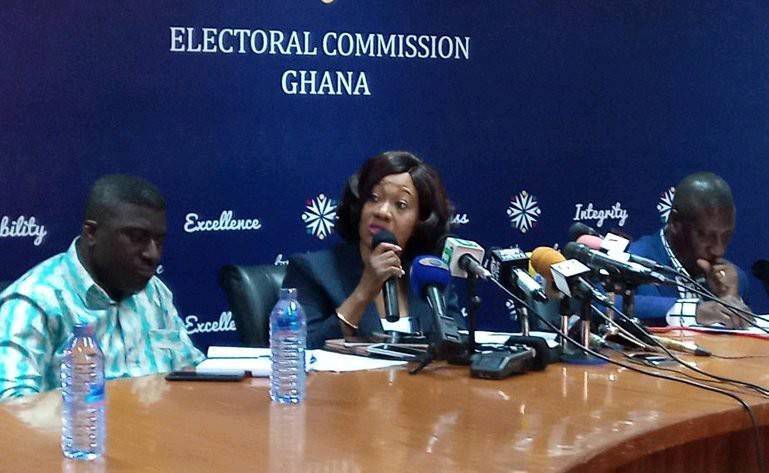With just days to go before Ghana’s general elections, special voting, a key process meant to ease voting for essential workers, has come under intense scrutiny. This exercise, designed to allow security personnel, media practitioners, and election officials to vote early, faced unexpected setbacks in the Eastern and Western regions. Concerns have since mounted over the Electoral Commission's (EC) handling of this critical aspect of the election process.
Initially scheduled for Sunday, the special voting exercise in the Eastern and Western regions had to be postponed due to the leakage of ballot papers intended for destruction. This incident, revealed during a press conference by EC Chairperson Jean Mensah, has caused widespread frustration and raised questions about the preparedness of the commission to oversee a smooth election process.
The EC quickly rescheduled the special voting in these regions for Thursday, December 5. However, this decision has done little to quell growing doubts among voters and analysts about the efficiency of the electoral body. Samuel Boateng, a political analyst, expressed concerns about the situation during a radio discussion on *Bryt Adekyee Mu Nsem*.
“Special voting is a crucial part of the election process,†Boateng explained. “It ensures that those who will be working on election day have the opportunity to cast their votes without interfering with their duties. If this process is flawed, it raises serious concerns about how the general election will be handled.â€
Boateng criticized the EC for what he described as a lack of attention to detail. He emphasized that the issue of ballot paper leakage could have been avoided with better oversight and planning. “Even if this was not intentional, it’s a mistake that shakes public trust. And trust is the foundation of any credible election,†he said.
The postponement of special voting has disrupted plans for many voters in the affected regions. For security personnel and other essential workers, the delay means juggling their duties with the rescheduled voting day. Some have expressed concerns about whether the tight timeline between the special voting and the general elections on December 7 could lead to further complications.
One police officer in the Eastern region remarked, “We are already preparing for deployment on election day. This delay means we now have to adjust our schedules. It’s stressful, and it could have been avoided.â€
The logistical challenges posed by the postponement also extend to the EC itself. Ensuring that the rescheduled special voting runs smoothly, while simultaneously preparing for the main election, will test the commission’s capacity and efficiency. Critics fear that any further mishaps could affect the credibility of the entire electoral process.
Jean Mensah, in her press briefing, reassured the public that the EC is taking all necessary steps to address the situation. She promised that measures have been put in place to prevent a recurrence of such incidents. However, for many Ghanaians, these assurances ring hollow in the face of repeated lapses.
Special voting, while a relatively small part of the electoral process, plays a significant role in setting the tone for the general elections. It provides a preview of the EC’s ability to manage the larger, more complex task of organizing a nationwide vote.
“The way the EC handles special voting tells us a lot about how ready they are for the main elections,†Boateng noted. “When something as basic as ballot paper security is compromised, it makes people question the integrity of the entire system.â€
Political observers have called for greater transparency in the EC’s operations. They argue that the commission must not only address the immediate issues but also take steps to restore public confidence. Civil society organizations have echoed these sentiments, urging the EC to prioritize accountability and communication in the lead-up to December 7.
For many Ghanaians, the upcoming special voting on December 5 will be a crucial test for the EC. It is an opportunity for the commission to redeem itself and demonstrate that it can handle the challenges of a high-stakes election.
The stakes are particularly high this year, with voters more engaged than ever in ensuring a fair and transparent process. Any further mistakes could have serious consequences, not only for the credibility of the election results but also for Ghana’s reputation as a beacon of democracy in Africa.
As the nation watches closely, the success of the rescheduled special voting exercise will depend on the EC’s ability to address the logistical, technical, and trust issues that have emerged. For now, all eyes are on December 5, a day that could shape public perception of the entire electoral process. Whether the EC rises to the occasion or falters again remains to be seen.
Ultimately, special voting is more than just an administrative exercise; it is a reflection of the electoral body’s commitment to fairness and efficiency. For voters, especially those directly affected by the postponement, it is a test of whether their voices will be heard in a system that must uphold its integrity at all costs.




No comments yet
Be the first to share your thoughts!